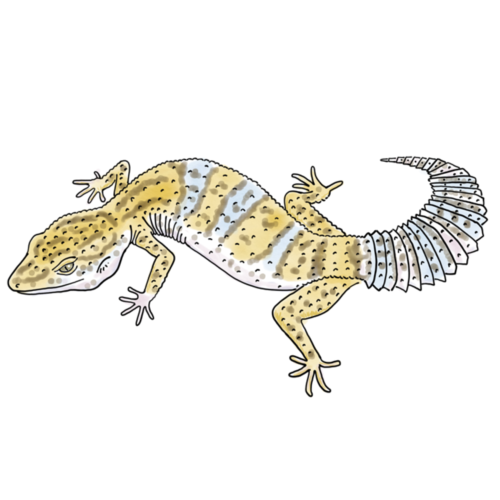Leopard Gecko - Eublepharis macularius
Please note: These are general recommendations; they are not meant to be construed as veterinary advice, and may not be appropriate for your pet. Be sure to schedule a visit with your local veterinarian to discuss the best care for your animal!
Leopard geckos are small and friendly lizards with long lifespans; they can live up to 30 years! They are native to desert areas in the Middle East.
Diet
Leopard geckos are active insect hunters with acute vision, and many geckos will refuse to eat food that isn’t moving (unless they are taught at a young age)! This means that a gecko who can’t see well may stop eating, so it’s important to keep a close eye...on their eyes! Insects from the store are low on nutritional value, so you should gut-load insects by feeding them (the insects) an insect diet for 1-2 days before feeding the insects to your gecko. Make sure you give your leopard gecko a variety of insects (such as crickets, dubai cockroaches, mealworms, silkworm larva, etc), but no fireflies! They are toxic! Dusting insects with calcium (more often) and vitamin powder (less often) is usually required to make a fully balanced diet, but it is easy to over-supplement; be sure to talk to your veterinarian about the right supplements for your gecko!
Like many reptiles, leopard geckos can get Metabolic Bone Disease (also called nutritional secondary hyperparathyroidism, which is much too long to say) if they don’t get the right amount of calcium and phosphorous in their diets. Again, be sure to talk to your vet about proper diets and supplements!
Housing
While historically we thought that Leopard Geckos did not need UV exposure because they are crepuscular (awake in the morning and evening rather than during the day), it has been found that they do better with a UVB bulb supplement indoors to act as the sun. Because their UVB requirements seem to be less than other reptiles, the lower power UVB bulbes are usually recommended. These lights usually need to be replaced every 6 months or so, because the UVB output will decrease even if the light still looks like it is functioning normally. The placement of the light is important as well; wire screens can reduce how much light reaches your gecko, and glass can block UVB light entirely! Generally lights should be kept between 12-18 inches above the cage floor.
Leopard Geckos are reptiles, so they are ‘cold blooded,’ which means they rely on the temperature of their environment to regulate their body temperature. Geckos need a basking spot in the cage where they can relax and enjoy the heat (around 90 degrees during the day) but they also need a cooler area of the cage (around 75 degrees) for when they are done basking. By moving between warmer and cooler areas, Leopard Geckos can make sure they keep their internal heat just right.
Leopard geckos kept on sand are at risk for impactions. They tend to eat some of the sand when they eat their food, and the sand builds up in their bellies. Because of this, alternatives such as clean newspaper or reptile carpet are safer options.
Leopard geckos need fresh water every day, and they also require a humid hide box. Usually this consists of a small enclosure with moist sphagnum moss where the gecko can rest and help shed dry skin. Be sure to replace the moss regularly and keep the hide box clean!
Handling:
Did you know leopard geckos can shed their tails? A gecko can drop its tail (called autotomy) when stressed or if the tail is grabbed. The tail can then twitch on its own, which distracts potential predators while the rest of the gecko runs away! But losing a tail is very hard on the poor gecko, so It is very important to never grab a gecko by the tail!
Zoonotic Diseases:
Be sure you wash your hands well after playing with your gecko to make sure you don’t get germs! Salmonella is particularly of concern for reptiles. Salmonella can live on and around your reptile without actually affecting your animal, but still is a risk to people. We cannot completely get rid of the salmonella in most cases, so it’s very important to always make sure you wash your hands after handling a reptile, and do not allow a reptile to roam freely in the house!
Dr. Chuck recommends leopard geckos go to the veterinarian at least once per year to make sure they are healthy and happy!
